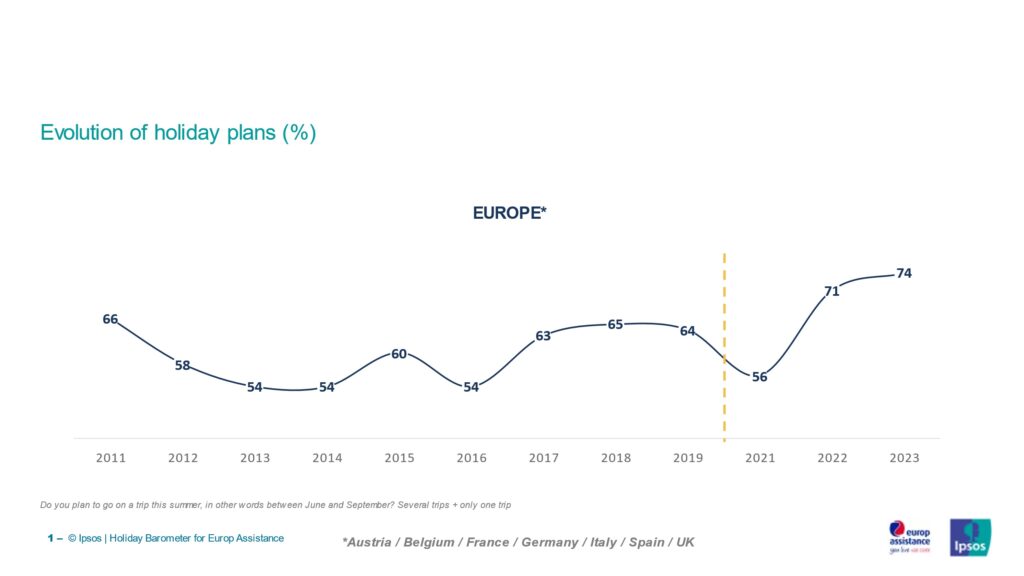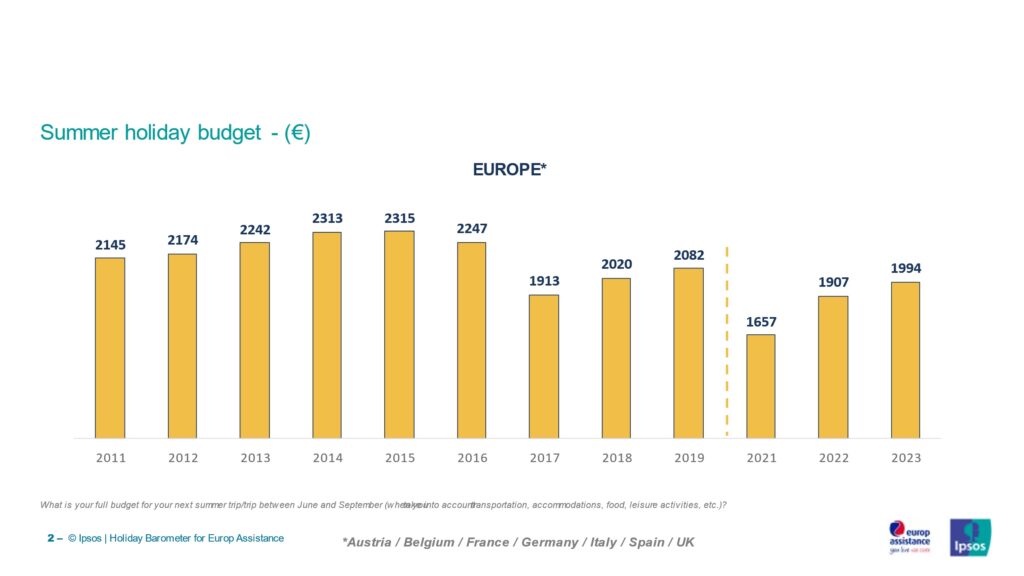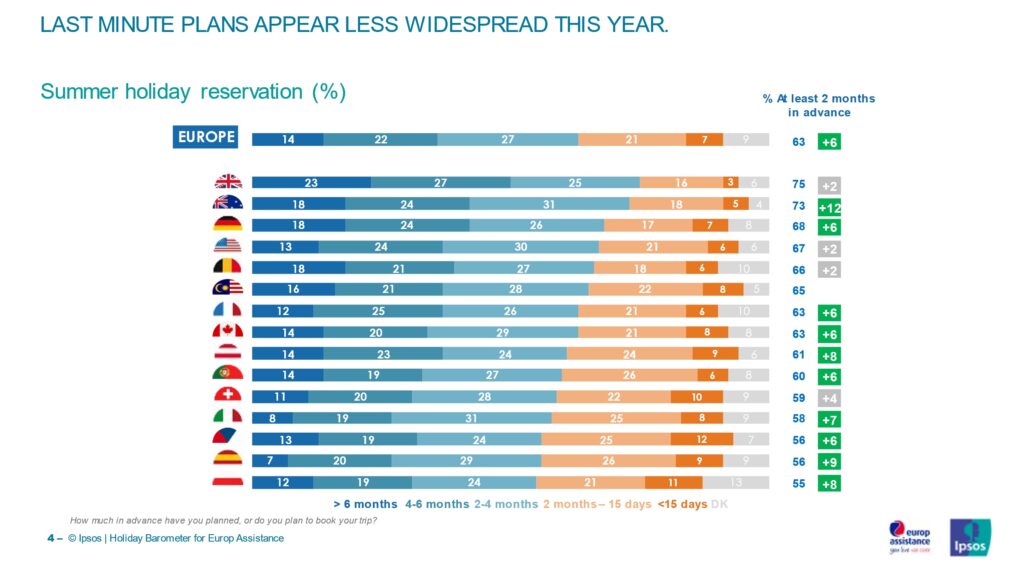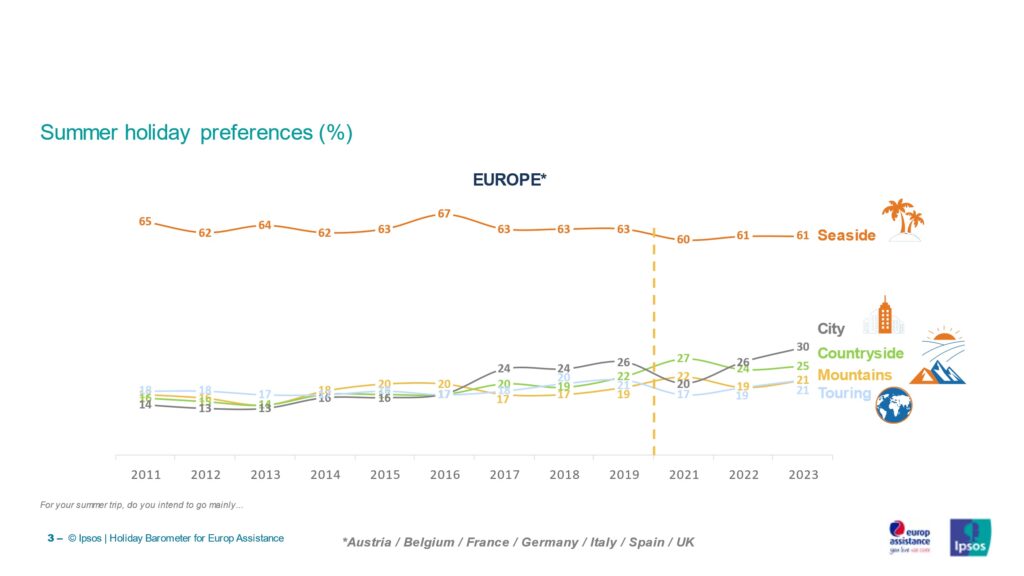Paris, 24 May 2023 – Europ Assistance (“EA”) today announced the output of their 22nd edition of the Holiday Barometer. The survey was conducted by Ipsos, a global market research firm, among 15,000 people across 15 countries. It tracks global travel trends. The survey was taken between March 20 and April 7, 2023.
Virginie Babinet, Head of International Travel at Europ Assistance Group, commented on the findings: “Despite the inflationary context, we note the strong desire of Europeans to travel after several years disrupted by Covid-19. As an international leader in travel insurance and assistance, we feel it is our responsibility, year after year, to understand the evolution of these concerns and enlighten the society. As we have done for the past 60 years, we continue to stand by travellers around the world, offering them solutions increasingly tailored to their needs”.
- Inflation is the first concern for travelers in all countries, far above other reasons. It replaces Covid in the list of concerns, which lost 19 points among European travelers and now at the bottom of the list.
Indeed, economic reasons are the first barrier among reasons not to travel, mentioned by 47% of Europeans who won’t be going on a trip this summer (+6pts vs 2022), 51% of Americans (+6%) and 50% of Canadians (+9pts).
- However, summer holidays remain sacred and sanctuarized.
- 78% of Europeans feel “really excited to travel” or “happy to travel” this year, a strong and growing enthusiasm (+6 pts) compared to 2022.
- It translates into an increase of the share of Europeans intending to travel during the summer as well, reaching 75% (+4 pts). It is the highest score since 2011
- Even if adaptations are being made to deal with inflation (cheaper accommodations, last minute deals), travel duration will not be reduced.
- Regarding travel trends this barometer allows to follow over time:
- Workation” is gaining in popularity among European actives: almost 3 out of 10 intend to work from their holiday location this summer, a 4-point increase compared to 2022 (28% vs. 24%).
It remains significantly below Americans, 36% of US actives planning a workation next summer. - Sustainable travel habits are strong in intentions, but don’t translate into massive behaviour changes:
- 2/3 of European holidaymakers declare they would be ready to switch transportation mode for a lower carbon impact
- …but they are almost twice as many intending to fly than in 2021 (37% this year, vs 33% in 2022 and 22% in 2021).
- Environmental impact ranks very low in the choice criteria for transportation (only 9%, where convenience represents 64%!)
- Workation” is gaining in popularity among European actives: almost 3 out of 10 intend to work from their holiday location this summer, a 4-point increase compared to 2022 (28% vs. 24%).
- Appeal of travel abroad regains popularity in Europe and Australia: 52% (+4pts) of Europeans, 50% (+14pts) of Australians intend to travel abroad this summer. This is less the case in North America.
- City adventures continue to gain attractivity: + 4 points among Europeans,and the most popular type of destination for North Americans.
Holidaymakers are eager to travel : despite the inflation context, they are not ready to make concessions on their holidays
Despite an economic context dominated by inflation, the enthusiasm to travel this summer is very strong, whatever the country. 78% of the Europeans are excited (31%) or happy to travel (47%), and the proportion is similar in USA, Canada, Australia and Malaysia (between 74% and 80%).
3 out of 4 Europeans intend to travel during the summer, representing a 4 point increase compared to 2022, and reaching the highest proportion since 2011, much higher than pre-Covid levels. This proportion is reaching 8 out of 10 in Czech Republic, Italy and Spain.
After the spectacular rebound seen in 2022, 2023 figures thus confirm this positive trend.

The proportion of Europeans planning summer trips remains significantly higher than North Americans (+11-12 points compared to Americans and Canadians) and Australians (+21 points). In the USA, if the trend is also positive (+3 pts vs 2022), the intention to travel is not back to pre-covid level.
Inflation, the new “normal”
Among the reasons that could dampen enthusiasm to travel next summer, inflation is clearly on top of the list. Almost 1/3 of Europeans (between 31% and 42% for Americans, Canadians, Australians, and Malaysians) declare prices increase very much impacts their enthusiasm. It is far above concerns about ecology, situation in Ukraine and Covid-19 (only 1 out of 10 saying it impacts very much their enthusiasm).
Moreover, when Europeans are asked about their main concern for their next trip, running out of money comes first (48% are concerned about this possibility, +2 points compared to last year).
Economic reasons are also the first barrier mentioned among reasons not to travel by the 47% of Europeans who will not be going on a trip this summer (+6pts vs 2022), 51% of Americans (+6%) and 50% of Canadians (+9pts).
The European holiday budget continues to increase since 2021, with a +6% compared to 2022 in Europe, now at 1918 €. This increase itself is also reflecting inflation in the Euro zone. Holiday budget also increases in the USA (+6% vs 2022) but stays stable in Australia and decreases in Canada (-7%).

In that context, adjustments are being made: one third of travelers (whether from Europe, North America or Australia) are willing to take cheaper means of accommodation or look for last minute deals. On the other hand, reducing their trip duration is the last adaptation they consider.

Covid-19 is now far away in travelers’ minds
Several indicators show that concerns related to Covid-19 and impact on travel habits are fading away with time: less travelers will avoid crowded places while travelling (decreasing in all countries, -6 points among Europeans), and are less numerous to fear an epidemic outbreak when travelling (-10 points among Europeans) or being quarantined abroad (-9 pts among Europeans).
Also, confidence is clearly back: 63% of Europeans travelers plan do book their trips at least 2 months in advance, a 6-point increase compared to 2022.
Indeed, the long-term effects of the Covid-19 crisis on holiday habits are far from obvious. Only 1 out of 6 say that they will plan more nature trips, the same share that they will have a stronger desire to travel.
Overall, when looking at issues impacting travel enthusiasm, Covid-19 has lost 19 points this year among Europeans and is now at the bottom of the list.
Travels abroad continue to regain popularity, showing again a “back to normal” trend
The trend of return to international travel, that was observed already last year, is confirmed this year but not in all countries: 52% of Europeans plan to travel outside their own country (+4 pts vs 2022). The same trend is observed in Australia (50%, +14 pts).
On the contrary, in North America intentions to travel abroad stagnate this year: only + 1 point in Canada (at 44% this years), and – 3 pts in the USA (33%).
To be noted, France is the only country where domestic travel intentions continue to grow: + 4 points, reaching 60% of travel intentions this year.
This choice of destinations translates into transportation modes: if personal car remains the most popular (50% in Europe, – 5 pts), it loses ground to plane this year (37%, + 4 pts)
Seaside remains the most popular choice by far for Europeans, that are twice as many to prefer seaside (60%) compared to cities (30%, countryside (25%) or mountains (23%).
However, city trips continue to gain in attractivity (+ 4 pts in Europe): this proportion has also doubled in 10 years (30% in 2023 vs 13% in 2013).
City trips are even the top destination, before seaside, in Canada and the USA.
Rest and the social aspect of travelling (come together as a family or with friend) remain the two summer holiday activities seen as the most ideal by international travelers. Discovery (new culture, change of scenery) completes the podium, this item increasing among Europeans, US and Australian travelers.

Workation: blurring the limits between work and holidays becomes more common
Workation is gaining ground in Europe, almost 3 out of 10 actives intend to work from their holiday location this summer, a 4 point increase compared to 2022 (28% vs. 24%). It remains significantly below Americans, 36% of US actives planning a workation next summer.
If 43% of intenders plan to do workation in their own country only, 52% consider doing it abroad (only or also).
Sustainable travel: despite awareness, difficulty to change travel habits
Sustainable travelling shows a gap between intentions and actions.
In declarations, sustainable travel habits are widespread:
87% of European travellers say they already or would be ready to support local economy, 82% to avoid activities not socially responsible or respectful of local cultures, 86% to pay attention to waste in the destination country.
However, when looking at the actual intentions, some gaps appear:
If 2/3 of European holidaymakers declare they would be ready to switch transportation mode for a lower carbon impact, only 36% are already doing it. In parallel, they are almost twice as many intending to fly than in 2021 (37% this year, vs 33% in 2022 and 22% in 2021). Moreover, environmental impact ranks very low in the choice criteria for transportation (only 9%, where convenience represents 64%!)
Similarly, 2/3 as well say they would be ready to travel to a closer destination for the same purpose, while more than half plan to go abroad this year (52%, +4 pts compared to 2022 and +19 pts compared to 2021).
Those data show a clear say/do gap in terms of sustainability and habits: while travellers are clearly aware of the importance of environmental issues, they don’t seem ready to radically change their travel habits yet.

Survey Methodology
The 2023 edition of the Holiday Barometer from Europ Assistance and Ipsos was conducted in 15 countries including the United States, Canada, United Kingdom, Italy, France, Spain, Switzerland, Germany, Austria, Portugal, Belgium, Poland, Czech Republic, Malaysia and Australia. In each country, 1,000 consumers aged 18 years and older took part in an online questionnaire. The survey was conducted between March 20th and April 7th and investigated consumer holiday plans and travel preferences.
About Europ Assistance group
Founded in 1963, Europ Assistance, the inventor of assistance, supports customers in over 200 countries and territories thanks to our network of 750,000 approved providers and 43 assistance centres. Our mission is to bring people or corporates from distress to relief – anytime, anywhere. We provide roadside assistance, travel assistance and insurance, as well as personal assistance services such as the protection of the elderly, the protection of digital identity, telemedicine and the Conciergerie. The vision of our 12,000 employees is to be the most reliable care company in the world.
Europ Assistance is part of the Generali Group, one of the world’s leading insurers.
About Ipsos
Ipsos is one of the largest market research and polling companies globally, operating in 90 markets and employing over 18,000 people. Our passionately curious research professionals, analysts and scientists have built unique multispecialist capabilities that provide true understanding and powerful insights into the actions, opinions and motivations of citizens, consumers, patients, customers or employees. Our 75 business solutions are based on primary data from our surveys, social media monitoring, and qualitative or observational techniques. “Game Changers” – our tagline – summarizes our ambition to help our 5,000 clients navigate with confidence our rapidly changing world. Founded in France in 1975, Ipsos has been listed on the Euronext Paris since July 1, 1999. The company is part of the SBF 120 and the Mid-60 indexes and is eligible for the Deferred Settlement Service (SRD). ISIN code FR0000073298, Reuters ISOS.PA, Bloomberg IPS:FP


